eldest: Difference between revisions
From LSJ
Ἔνιοι κακῶς φρονοῦσι πράττοντες καλῶς → Multi bonis in rebus haud sapiunt bene → Trotz ihres Wohlergehens denken manche schlecht
(Woodhouse 2) |
(CSV4) |
||
| Line 1: | Line 1: | ||
{{ | {{Woodhouse1 | ||
| | |Text=[[File:woodhouse_264.jpg|thumb|link={{filepath:woodhouse_264.jpg}}]]'''adj.''' | ||
P. and V. πρεσβύτατος, V. προφέρτατος, [[πρέσβιστος]]. | |||
Fem. adj., Ar. and V. [[πρέσβειρα]] (<b class="b2">of a goddess</b>). | |||
<b class="b2">Because he was his eldest son</b>: P. διὰ τὸ πρεσβεύειν ἀπʼ [[αὐτοῦ]] (Thuc. 6, 55). | |||
<b class="b2">The share of the eldest</b> (<b class="b2">in inheritance</b>): P. [[πρεσβεῖον]], τό. | |||
}} | }} | ||
Revision as of 09:37, 21 July 2017
English > Greek (Woodhouse)
adj.
P. and V. πρεσβύτατος, V. προφέρτατος, πρέσβιστος. Fem. adj., Ar. and V. πρέσβειρα (of a goddess). Because he was his eldest son: P. διὰ τὸ πρεσβεύειν ἀπʼ αὐτοῦ (Thuc. 6, 55). The share of the eldest (in inheritance): P. πρεσβεῖον, τό.

